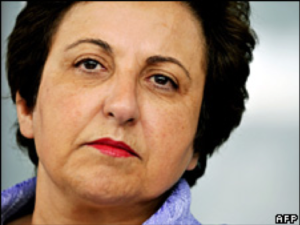
Shirin Ebadi
Shirin Ebadi was born in Hamadan, Iran, in 1947. Her family consisted of academics and practising Muslims. Shirin Ebadi moved to Tehran with her family when she was a year old.
Shirin Ebadi received her law degree and began to serve officially as a judge in March 1969. She was the first woman in the history of Iranian justice to be appointed a judge. While serving as a judge, she also obtained a doctorate from Tehran University.
After the victory of the Islamic Revolution in February 1979, following the belief that Islam forbade women to serve as judges, Shirin Ebadi and other female judges were dismissed from their posts and given clerical duties. Shirin was made a clerk in the very court she once presided over! When all the former female judges protested against their demotion, they were designated as “experts” in the Justice Department. Shirin Ebadi could not tolerate the situation any longer and took an early retirement. Her application for practising law was turned down and she was, in effect, housebound for many years. Shirin Ebadi used her time of unemployment to write several books and had many articles published in Iranian journals. Finally, in 1992, Shirin Ebadi succeeded in obtaining a lawyer’s licence and set up her own practice.
After receiving her lawyer’s licence, Shirin Ebadi took up the struggle for fundamental human rights and especially the rights of women and children. She took part in the establishment of organizations that placed these issues on the agenda, and wrote books proposing amendments to Iran’s succession and divorce laws. She also wanted to withdraw political power from the clergy and advocated the separation of religion and state.
Shirin Ebadi took up many cases in courts and began defending people who were being persecuted by the authorities. She defended several journalists accused or sentenced for expressing their views. Among others, she represented the families of students, who were killed during an attack on the university dormitory. She also took on a large number of social cases including those involving child abuse. She also represented the mother of Zahra Kazemi, a photojournalist killed in Iran.
In 2000, Shirin Ebadi was accused of distributing the video-taped confession of a hardline hooligan who claimed that prominent conservative leaders were instigating physical attacks on pro-reform gatherings and figures. She was given a suspended jail sentence and a professional ban.
Shirin Ebadi was awarded the Nobel Peace Prize in 2003. In its choice of Ebadi, the Nobel Committee expressed a wish to reduce the tensions between the Islamic and the Western worlds following the terrorist attack on the US on 11 September 2001. At the same time, the Committee wished to extend a helping hand to the Iranian reform movement. The committee also paid tribute to her courage, noting that she had “never heeded the threat to her own safety”. In November 2009, Shirin Ebadi’s Nobel medal was confiscated on the orders of Tehran’s Revolutionary Court.
Shirin Ebadi left Iran for a conference the day before President Mahmoud Ahmadinejad’s disputed re-election in 2009 and has not returned since. She is living in exile in the UK.
Shirin Ebadi is married to an electrical engineer and they have two daughters.
Afterword: Shirin Ebadi is the author of several books including Until we are free : my fight for human rights in Iran.
